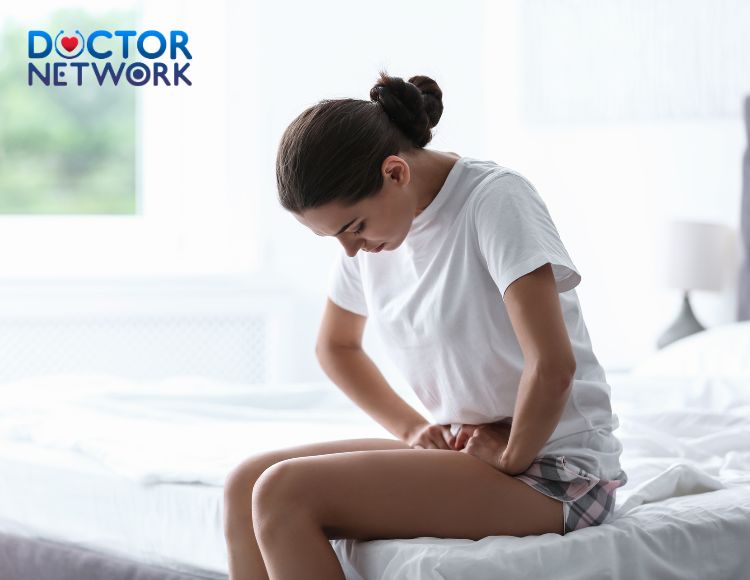Infections in the intimate area are a common condition among women, causing various uncomfortable symptoms such as itching, burning, abnormal discharge, and foul odor. This condition can stem from different causes, including bacteria, yeast, parasites, allergies, or unsafe sexual practices.
Proper way to clean infected intimate area is crucial to alleviate discomfort and support the treatment process. Additionally, applying appropriate preventive and treatment measures will help you quickly regain comfort and confidence.
The Importance of Cleaning Infected Intimate Areas
Causes of Infections in the Intimate Area
- Bacteria: An imbalance in the vaginal microbiota, often due to improper hygiene or unsafe sexual practices, allows harmful bacteria to overgrow, causing infections.
- Yeast (Candida): The yeast Candida albicans normally resides in the vagina in small quantities. However, factors such as antibiotic use, hormonal changes, pregnancy, or diabetes can cause the yeast to proliferate, leading to infection.

The yeast Candida albicans normally resides in the vagina in small quantities
- Parasites: Trichomonas vaginalis is a sexually transmitted parasite that causes trichomonas vaginal infection.
- Allergies: Some women may be allergic to feminine hygiene products, condoms, lubricants, or other substances that come into contact with the intimate area, causing irritation and infection.
- Sexual Intercourse: Rough or unsafe sexual practices can damage the vaginal mucosa, making it easier for bacteria to enter and cause infection.
Recognizing Signs of Infection in the Intimate Area
- Itching: This is the most common symptom of vaginal infections. The itching can range from mild to severe, accompanied by a burning sensation.

Proper way to clean infected intimate area is crucial to alleviate discomfort and support the treatment process
- Abnormal Discharge: Discharge may change in color, smell, and consistency. Infected discharge is often cloudy white, yellow, or green, can be thick like cottage cheese or watery, and may have a fishy or foul smell.
- Burning Pain: You may feel a burning sensation when urinating, during sexual intercourse, or when touching the intimate area.
- Swelling and Redness: The vulva may become swollen, red, and hot.
- Abnormal Vaginal Bleeding: There may be small blood spots or light bleeding between menstrual cycles.
Proper way to clean infected intimate area
- Gentle Cleaning – way to clean infected intimate area: Wash the intimate area with clean warm water, moving from front to back to avoid spreading bacteria from the anus. Avoid using strong soaps, fragrances, or dyes, as these can dry out the skin and cause irritation.
- Use Feminine Hygiene Products – way to clean infected intimate area: Choose products with a balanced pH (3.8 – 4.5) and soothing ingredients like aloe vera or chamomile. Avoid douching, as this can disrupt the natural pH balance and worsen the infection.
- Thorough Drying: After cleaning, gently pat the intimate area dry with a soft, clean towel. Avoid vigorous rubbing, as this can irritate the skin.
- Frequent Underwear Changes – way to clean infected intimate area: Choose breathable cotton underwear that absorbs sweat well. Avoid tight or nylon underwear, as they can retain moisture and create a favorable environment for bacteria growth.
- Avoid Sexual Intercourse: way to clean infected intimate area – During an infection, refrain from sexual intercourse to prevent further damage to the vaginal mucosa and worsening of the infection.

Avoid Sexual Intercourse – way to clean infected intimate area
Preventing Infections in the Intimate Area
- Maintain Cleanliness: Clean the intimate area at least twice a day, especially after using the toilet and before bedtime.
- Wear Breathable Clothing: Choose cotton underwear and avoid tight-fitting clothes.
- Avoid Overuse of Antibiotics: Excessive use of antibiotics can kill beneficial bacteria in the vagina, allowing yeast to proliferate.
- Change Sanitary Products Regularly: During menstruation, change sanitary products frequently (every 4-6 hours) to avoid creating a moist environment conducive to bacterial growth.
- Use Condoms: Condoms not only prevent pregnancy but also protect against sexually transmitted infections.
- Regular Gynecological Check-ups: Visit the gynecologist at least every six months to check the health of the intimate area and detect any early signs of disease.
Treating Infections in the Intimate Area
Depending on the cause of the infection, the doctor may prescribe antibiotics, antifungal medication, or antiparasitic drugs. For infections caused by allergies, you need to avoid contact with allergens and use antihistamines as prescribed by the doctor.
Note:
- Do not self-medicate without a doctor’s prescription.
- Follow the treatment regimen correctly.
- If symptoms do not improve or worsen, return to the doctor for timely consultation and treatment.
In addition to medication, you can consider home remedies such as soaking the intimate area in warm saline water and using feminine hygiene products with probiotics to balance the vaginal microbiota.
Proper cleaning and preventive measures are key to maintaining intimate health. Listen to your body and seek medical support when necessary.
5 Frequently Asked Questions about “way to clean infected intimate area”
Should I douche when I have an infection?
No, you should not douche when you have an infection. Douching can disrupt the natural pH balance of the vagina, remove beneficial bacteria, and create conditions for harmful bacteria to thrive, worsening the infection.
What type of feminine hygiene products should I use when infected?
When infected, choose feminine hygiene products with a balanced pH (3.8 – 4.5) and soothing ingredients like aloe vera or chamomile. Avoid products with fragrances, dyes, or strong soaps as they can cause irritation.
Can I use natural remedies to clean an infected intimate area?
Some natural remedies can help alleviate infection symptoms, such as soaking the intimate area in diluted saline water, or using betel leaf or green tea to gently wash the outer area. However, do not overuse these methods and consult your doctor before trying them.
Can vaginal infections heal on their own?
Depending on the cause, some mild infections may heal on their own with proper hygiene and good care. However, if symptoms do not improve or worsen, see a doctor for diagnosis and timely treatment.
How can I prevent vaginal infections?
To prevent vaginal infections, you should:
- Maintain cleanliness, washing twice a day with warm water and suitable feminine hygiene products.
- Wear breathable clothing and avoid tight clothes.
- Change sanitary products regularly during menstruation.
- Avoid douching.
- Practice safe sex by using condoms.
- Have regular gynecological check-ups.
Scientific References on “way to clean infected intimate area”
- American College of Obstetricians and Gynecologists (ACOG): ACOG recommends gentle cleaning of the intimate area with warm water and mild, fragrance-free soap. Douching is not recommended as it can disrupt the natural vaginal microbiota and exacerbate infections.
- U.S. National Library of Medicine (NLM): NLM advises against using feminine hygiene products with fragrances, dyes, or preservatives, as they can irritate the sensitive intimate area.
- International Journal of Gynecology & Obstetrics (IJOG): A 2018 study in IJOG found that using feminine hygiene products with a balanced pH (3.8-4.5) helps maintain a healthy vaginal microbiota and reduces infection risk.
- Clinical and Experimental Dermatology: A 2016 study in this journal indicated that using alcohol-containing wipes on the intimate area can dry out the skin and cause irritation, increasing the risk of infection.
- The Journal of Sexual Medicine: A 2015 study in this journal highlighted that unsafe sexual practices can increase the risk of bacterial and parasitic vaginal infections.
Conclusion
In addition to proper hygiene, understanding the causes and applying preventive measures are equally important. If the infection does not improve or worsens, seek medical advice for timely diagnosis and treatment.
Remember, way to clean infected intimate area is a crucial part of overall health care. By applying the knowledge and advice in this article, you can confidently maintain intimate health and enjoy life to the fullest.
References:
Kiểm Duyệt Nội Dung
More than 10 years of marketing communications experience in the medical and health field.
Successfully deployed marketing communication activities, content development and social networking channels for hospital partners, clinics, doctors and medical professionals across the country.
More than 6 years of experience in organizing and producing leading prestigious medical programs in Vietnam, in collaboration with Ho Chi Minh City Television (HTV). Typical programs include Nhật Ký Blouse Trắng, Bác Sĩ Nói Gì, Alo Bác Sĩ Nghe, Nhật Ký Hạnh Phúc, Vui Khỏe Cùng Con, Bác Sỹ Mẹ, v.v.
Comprehensive cooperation with hundreds of hospitals and clinics, thousands of doctors and medical experts to join hands in building a medical content and service platform on the Doctor Network application.

























